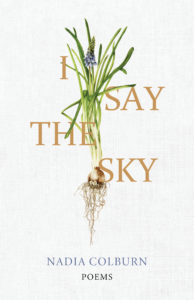 Review by Sharon Tracey
Review by Sharon Tracey
I Say the Sky, the second poetry collection by Nadia Colburn—poet, teacher, literary critic, and writing coach—is an immersive and moving read—infused with earth, the body, family, memory, love and anxiety, environmental devastation and beauty, trauma and community. Poems often startle and ring, and there’s the sensation of being inside the inner life of the poet.
Colburn’s style is direct and conversational, and she has a deft way of transforming elemental objects and rituals of daily life into something larger. Stones are not just stones but a young girl, a door. And however deeply Colburn may dive into her own childhood trauma, she roots us in the natural world, what’s both here and come before, aware of the work it takes to be present to it all. Leaking methane, three billon birds gone, whales suffering the cacophony of passing ships, a purple flower rooting on the shortest day of the year. She writes, “I want so bad to live sometimes I forget I am alive.”(8)
Colburn uses repetition to great effect—showing that one can always try to speak. Say it. Say it again. Claim the power of that.
In “The End of History” (9) she begins,
History, I say, with its high ramparts, its engraved swords.
I say the bees are falling from the skies, the apples will not
come into bloom this year
or next. The fish gorge themselves on plastic.
Or I say the sky is blue today with nimbus clouds.
I say the girl, her clothes ripped off, underneath the guard’s
heavy weight,
is named Deborah. I say the child frozen at his mother’s breast
has stopped
his cries. We must do something.
So the poet speaks and the sky and stones and roots appear and reappear. She carries a small stone with no name through several poems. Spits it out of her mouth and survives.
Now come inside her house. No poem does this better than “Anxiety” (19) where the poet takes us through three stages. In part I, a voice is speaking to her. From inside, close and menacing: “Come here; go back; stand up; sit down—the self/like some dog to follow the commands.” A palimpsest of past trauma? Something more? She’s open, vulnerable, directly speaking to the reader (in fact, later she’ll give us our own postscript, an unusual and intimate touch).
Then there’s the poet pushing back as part II opens: (23)
eat & clean.
money & write.
in the closed box
of the three hours & a half
while the children
are attended,
let me grant,
for this space,
that nothing
is missing.
And later, the opening of part III (24):
What is missing? In the house of my life. In the moment of
my life. In the kitchen opening the refrigerator door
putting away the milk. When the voice comes. And I try to turn
it off.
This poem, like many others, is imbued with a feeling of “immediacy,” so fresh it’s sort of thrilling, as if she’s writing the poem in our presence. Something stripped and raw. A looking back that’s her and there while also here and now.
Other poems are infused with wonder and light. In “Invocation” (61) the poet offers us:
Sleep, like a golden rain,
fall through me.
Hard earth, that resists the shovel’s metal blade,
yield.
Buried seed, grow plump, split,
push out your extravagant green tendril
reaching for the sun–
And in the opening of “Rain Pours off the Eaves of the House” (80) she writes:
onto the concrete.
And finally, I open my throat:
world, I say,
of floods and droughts,
world of the red heart,
the heart of pink beneath the clouds,
of the tenderhearted, of the clenched-hearted,
of the troubled-, somersaulted-, suspended-hearted:
someone is coming to meet me.
The table is set.
There is a concept in ecology I kept returning to as I read Colburn’s collection—the edge effect—that concentration of fecundity, diversity, and change found along the boundary and overlap of two habitats. Where there’s more happening. Maybe not happiness but something rich and filled with hope.
I Say the Sky by Nadia Colburn
University Press of Kentucky, 2024, $19.95 [paperback]
ISBN: 9780813198644
Sharon Tracey is a poet and editor and the author of three books of poetry: Land Marks (Shanti Arts 2022), Chroma: Five Centuries of Women Artists (Shanti Arts 2020), and What I Remember Most is Everything (All Caps Publishing). Her work has appeared in Radar Poetry, Terrain.org, Lily Poetry Review, The Ekphrastic Review, and elsewhere. She previously served as a director of research communications and environmental initiatives at the University of Massachusetts Amherst.
